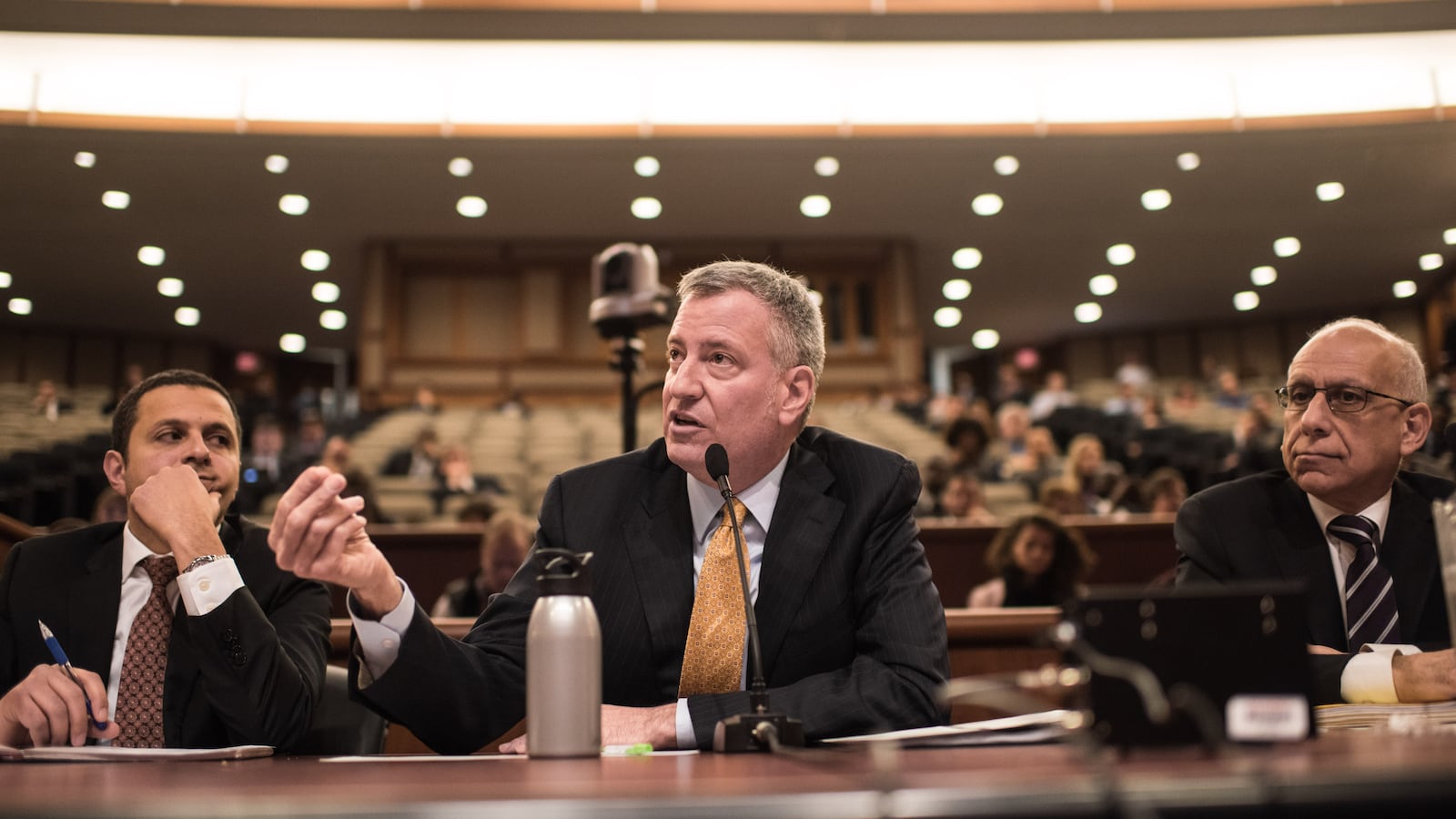With one full day left in the legislative session, New York’s education issues boil down to this: What will happen to mayoral control?
Each of the past two years, Mayor Bill de Blasio has received a one-year extension, both times setting up another round of political haggling. Now, with control of New York City schools expiring at the end of June, lawmakers must decide if they will grant another extension, how long it will last, and whether it will come with strings attached.
“There’s only three days left,” Mayor Bill de Blasio said at a press conference on Monday. “Our children’s futures hang in the balance.”
Mayoral control of New York City schools has many backers and there is little support for the alternative. De Blasio asked for a multi-year extension, Governor Andrew Cuomo suggested a three-year extension, the Assembly has already passed a two-year extension. Even opponents of the mayor do not suggest returning to a system of 32 different community school boards, which most agree led to dysfunction.
“If they don’t [renew mayoral control], the entire system will slide back into the old, decentralized structure we had before,” wrote Chancellor Carmen Fariña in Chalkbeat. “That would mean chaos, gridlock and corruption.”
Yet, as recently as Friday, Governor Andrew Cuomo said mayoral control “does not have the support to pass.” That’s largely because Senate Republicans, who have long had a frosty relationship with de Blasio, stand in the way.
Senate Majority Leader John Flanagan has made it clear he wants to tie mayoral control to expanding school choice, including upping the number of charter schools that can open in New York City.
“Denying charters the ability to grow and preventing parents’ ability to choose would shut the door on 20 years of proven gains in academic achievement,” Flanagan said in a statement. “We can not allow that to happen, and will not grant a long-term extension of mayoral control without first ensuring that all students have opportunities.”
The Senate has passed three different options for extending mayoral control, linking control of New York City schools to charter school growth. The longest extension, a five-year deal, would enact a controversial education tax credit, which is strongly opposed by Assembly Democrats. (Assembly Speaker Carl Heastie called the trio of bills a “non-starter.”)
Both parties’ hard stance has left some wondering if lawmakers will not reach a deal by Wednesday, when the session ends.
“I’m personally somewhat pessimistic just given the rhetoric,” said Bob Lowry, deputy director of the New York State Council of School Superintendents.
There is precedent for letting mayoral control expire. It happened to former Mayor Michael Bloomberg in 2009, which resulted in a brief resurrection of the New York City Board of Education in July of that year. The ordeal ended in early August, when lawmakers approved a six-year extension of mayoral control.
So far, de Blasio has avoided letting mayoral control lapse entirely. But each time he has gained a year extension, the “big ugly” deal has brought concessions for charter schools.
In 2015, along with mayoral control, state officials increased the number of additional charter schools that could open in New York City from 25 to 50 and removed the specific number of charters assigned to each of the state’s authorizers. Last year, the deal made it easier for charter schools to switch authorizers.
Both measures helped schools authorized by the New York City Department of Education switch to SUNY or the state’s Board of Regents. Many prefer those authorizers because the city’s education department cannot authorize any new schools — a problem for charter school networks interested in growing.
This year, there has been talk of lifting New York City’s charter school cap. Currently there is a limit on the number of charter schools that can open statewide, and a smaller limit for New York City. Cuomo proposed ending the city’s cap in January, but the proposal did not make it into the final budget deal.
As of June 2017, state law allows for 23 more charter schools to open in New York City, according to the New York City Charter School Center. That means the city is getting close to the cap, but also that the issue could be pushed to next year.
State officials could also tie mayoral control to a requirement for additional oversight of the city’s schools. Last year, lawmakers threatened to appoint an “education inspector,” which did not come to pass. The final deal contained a requirement to release more detailed budget information. (Already this year, Flanagan blasted the mayor for providing school budget information that he believes “does not satisfy the law.”)
Trading mayoral control for more oversight has historical precedent, too. In 2009, when lawmakers ended their stalemate by giving Bloomberg a six-year renewal of mayoral control, they tied the extension to greater oversight from the city’s Independent Budget Office.
Though history suggests extending mayoral control invites concessions, many advocates are hoping the policy is renewed without gamesmanship.
“Extending mayoral control in New York City must be completed before lawmakers leave Albany,” Timothy Kremer, the head of New York State School Boards Association, said in a statement. “The education of children and the leadership of the school system should not be fodder for end-of-session horse-trading.”

